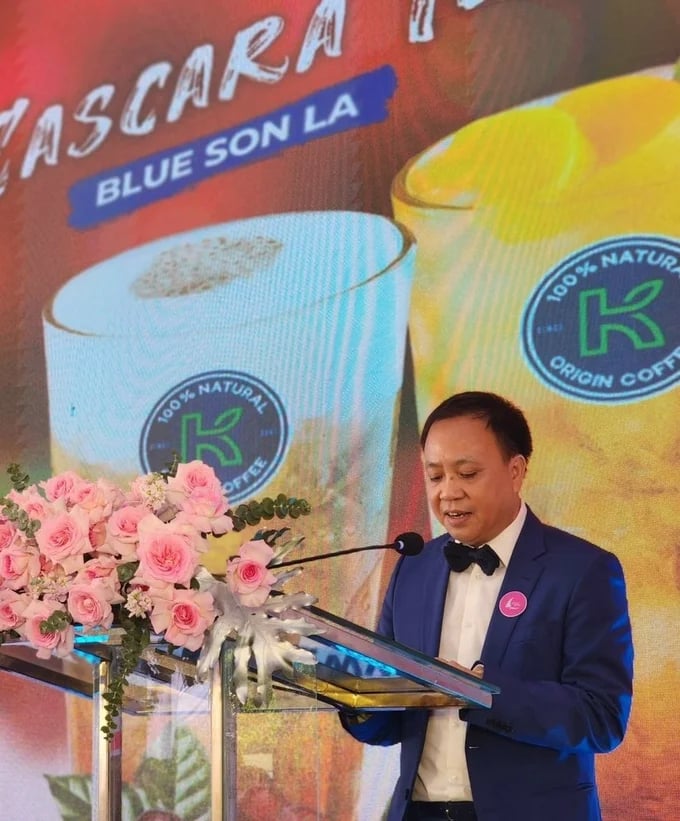May 17, 2025 | 19:39 GMT +7
May 17, 2025 | 19:39 GMT +7
Hotline: 0913.378.918
May 17, 2025 | 19:39 GMT +7
Hotline: 0913.378.918

Inauguration of the cascara tea factory in Son La
Cascara tea, also known as coffee tea, has become popular in cafes in European and American countries. The word “cascara” in Spanish means husk or skin. This drink is an herbal beverage made from the dried skins of coffee cherries.
Cascara tea has been used in South American countries for about 50 years and the United States has been selling it domestically for a long time. However, in Vietnam, cascara tea is still very new and Phuc Sinh is the first company to exploit cascara tea products on a large scale at Phuc Sinh Son La factory located in Mai Son district, Son La province.
Over the world in recent years, many countries have favoured Cascara Tea, in Europe they buy it at nearly double the price of Wash Arabica coffee. Cascara tea is a type of tea that can bring many benefits. It can help us maintain a reasonable weight, have good digestion, and have many antioxidants that help keep the user's skin smooth.
Vietnamese-branded cascara tea is produced with a production line that includes a food-standard fruit cleaning system, peeling, UV drying, multi-function freeze drying system that ensures cleanliness and retains flavour, and colours, and the automatic packaging system that can produce square filter bags and triangle filter bags. The design line capacity is 0.5 tons per production batch and employs 3 workers.

Chairman of Phuc Sinh Group Phan Minh Thong affirmed the value of the cascara tea brand.
Speaking at the inauguration ceremony of Vietnam's first factory producing cascara tea according to international standards to supply the domestic and export markets, the Chairman of Phuc Sinh Group Phan Minh Thong, shared: “We can see that almost 100% of coffee cherries are destroyed by composting or burning; we face a lot of pollution problems caused by coffee peels. However, with this cascara tea production line combined with the Wash Arabica processing process, we have a special type of tea that brings very high nutritional and economic value. We are very proud to contribute to such a circular ecosystem and green environment.
We have been processing cascara tea for the past few years, but today we officially built a factory and produced a much larger output. We export up to 99% of our output to countries that use cascara tea in the world such as Italy, France, and other European countries".
Translated by Hoang Duy

(VAN) In the face of counterfeit and imitation products, Khanh Hoa Salanganes Nest Company hopes for the prompt completion of the legal framework, strict enforcement against violations, and protection of the bird’s nest brand.

(VAN) Japan's efforts to lower the price of rice through the release of its stockpile may finally be making some progress, albeit at a snail's pace.

(VAN) U.S. tariffs are not only a 'shock', but also an opportunity for Vietnamese businesses to renew their mindset toward comprehensive development.

(VAN) As Bac Giang lychee enters the harvest season, Minister Do Duc Duy expects that the fruit will contribute greatly to agricultural exports due to standardized production and deep processing.

(VAN) Consumers have shown a preference for free-range eggs, but those farming systems are more vulnerable to biosecurity risks like bird flu.
/2025/05/09/5701-1-184335_301.jpg)
(VAN) Vietnam’s eel exports nearly doubled thanks to a mud-free farming model, opening up new prospects while still facing numerous barriers related to international standards.

(VAN) Minister Do Duc Duy warned that if production is not professionalized and supply chains are not transparent, the U.S. market could become a growth bottleneck.